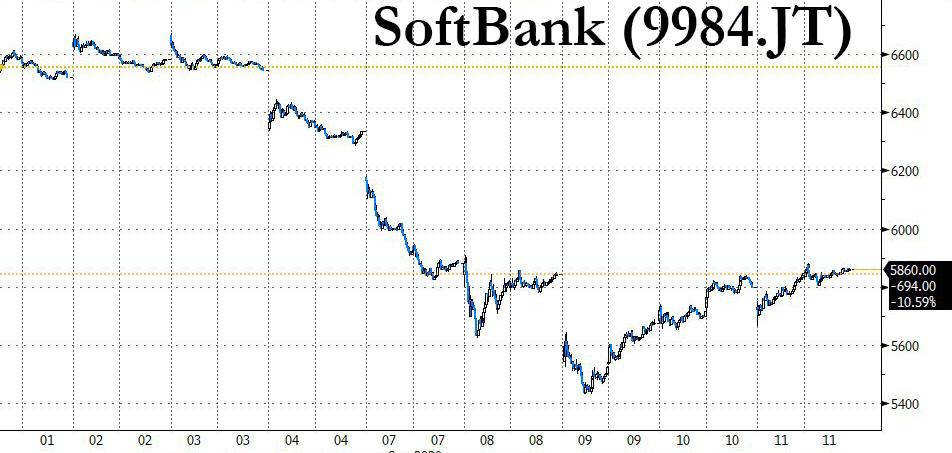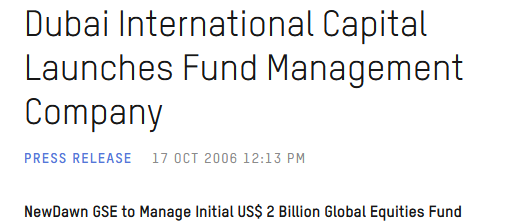“Your Money Is Gone. All Gone”: How SoftBank’s Call Spread Strategy Led To Catastrophic Results – A Thread
Tyler Durden
Sat, 09/12/2020 – 13:00
In the aftermath of reports both here and elsewhere which identified SoftBank as the “hedge fund” responsible for much of the August gamma meltup via the use of aggressive call spreads, the stock of the Japanese financial conglomerate tumbled as much as 17%, an unacceptable outcome to CEO Masa Son who delights in parading with his surging stock (to the point where we dutifully advises investors that SoftBank’s buyback program is the second largest only after Apple).
The result was a half-hearted leak through Bloomberg that the bank is “reconsidering” the use of its notorious market-moving costless collar derivative strategy, the creation of the Akshay Naheta, a SoftBank senior vice president in Abu Dhabi who previously was also the brain behind a similar costless collar “investment” in the now confirmed Wirecard fraud, and who honed his derivative strategies at his hedge fund, Knight Assets, where he generated a staggering 112.5% annually and before that at Deutsche Bank where he was Head of Principal Strategies. As a result, we dubbed Akshay the “gamma whale.”
That said, it wasn’t clear just “what changes might be made” to the SoftBank group responsible for public equity investment. All we know is that Masa Son was on it in hopes of easing investor fears that SoftBank was transitioning to a full-blown hedge fund dabbling in highly risky derivative strategies.
But were these strategies really risky? Curiously, much of the media’s softball coverage of SoftBank’s strategy focused on the fact that “costless” call spreads, due to their zero invested capital, are effectively free trades and guaranteed to make money if the underlying stock goes up, while hedged in case of downside.
Well… no. As the following fascinating thread form Kenneth Monahan, currently a market structure and technology analyst at Greenwich Associates (and formerly, also at Deutsche Bank) reveals, such “riskless” call spreads can have catastrophic consequences as Dubai International Capital, the international investment arm of Dubai Holding, a global conglomerate and sovereign wealth fund of the government of Dubai and its ruling family, and which no longer exists learned the hard way just before the financial crisis struck.
We republish his observations for the benefit of Masa Son who, it appears, may not have been too clear what he was getting himself into.
So… for a Friday afternoon break from actual work, I’m going to tweet out a thread about another large corporate entity financed from the Arabian peninsula that came to grief through absolutely massive option trades: Dubai International Capital which no longer exists. https://t.co/VGfeGXErzG
— Kenneth Monahan (@Foudroyant) September 11, 2020
The full thread is below:
So… for a Friday afternoon break from actual work, I’m going to tweet out a thread about another large corporate entity financed from the Arabian peninsula that came to grief through absolutely massive option trades: Dubai International Capital which no longer exists.
In 2006, while I was working at Deutsche Bank on building the MENA equities business we were approached by DIC about investing in a fund they were going to create which would invest in 1-3% stakes in companies in the global 500 as researched by their staff of analysts.
The fund was structured as a hedge fund and it was going to charge us 2% % 20% as was the standard at the time. What’s more, if we invested in the fund, we would be on the list of firms who would be able to engage in financing and options transactions related to these stakes.
This of course seemed totally preposterous to me. We’re going to pay 2&20 to a bunch of guys who are going to somehow miraculously have better insight into the most thoroughly analyzed companies on Earth than the thousands of other analysts?
I could generate virtually the same return by picking 5 names at random from the S&P 500 and pay no fees. They were counting on our greed for the fees on these large transactions but we’d just wind up being both sides of the trades, it made no sense to me.
“But wait….” the cap-intro people say, “this is not full risk, all these massive equity stakes will be hedged with costless collars such that we can never lose more than 10% on any one name.” Hmmm…. interesting.
What this really means, is that when they buy 1% of some company, they’re going to instantly buy a 10% out of the money puts, and sell whatever strike call is necessary such that the price of the call and the put are equal so no cash goes out the door.
The practical effect of this is to turn the portfolio of stocks into a portfolio of call spreads, sound familiar? Obviously I am even less enthusiastic about investing in a portfolio of call spreads so, to the consternation of our sales staff, I laugh them out the door.
However, for some insane reason, other banks actually pony up billions of dollars, and the fund gets launched.
What’s more, they actually went out and executed the plan, buying huge stakes in companies around the world and achieving the funds true purpose: making it look like Dubai had a sovereign wealth fund like Abu Dhabi and Qatar.
Something to notice here, the initial giant stakes that DIC bought were in financial services companies in the summer of 2007.
Then one night, in April of 2008, I’m working late and I get a call from a friend of mine whose brother works at DIC and who has been told that I know a lot about options. He asks if I can meet the DIC management team for a drink over near the Burj Dubai, curious, I go.
When I get there, the first 30 minutes are the standard go-go Dubai pitch. DIC is rocking the world the management team are the best, the smartest guys, and though they work for a state entity, they get personal points on the P&L (a much better deal than we got at DB.)
What’s more, they’re just getting started. They raised $10 billion and so far they’ve only deployed $2 billion. It’s going to be a roller coaster to the moon for them. What’s more, if I prove helpful enough, maybe I could join them for the ride… these hints were common in Dubai
So… down to business. Well, they have some issues with their derivative transactions and they want to know what they can do. Can I suggest changes in structure? The whole task of restructuring has been complicated by the fact that their PB has stopped sending them risk reports.
Hmmm… this is all very curious. So, where were the trades when they put them on. They tell me. Where are the shares now? Down about 30% from the highs (Bear Stearns had collapsed a few weeks before.) How long dated were the collars? 1 year, with 3 months left to run.
I look from one, to the next, and realize to my horror that they don’t see it and I say:
“Well gentlemen, that’s your problem right there. The reason your PB is not sending you any risk reports, is that you no longer have any risk on. Your shares are so far below the put strike that you no longer have any exposure to the stock at all. It’s as if you don’t own it because one for one it’s pledged to the puts.”
To which one of them replies, hilariously “But it’s still our name on the shareholder register!”
To which I reply “Indeed it is, and it will remain there until three months from now when you exercise your puts and sell it 20% up from here to the firm that sold you the puts. In the interim, the presence on the shareholder register is the ONLY connection you have. You no longer have any economic interest in them, only a legal one. In short gentlemen, your money is gone. All gone.”
Surely there is something we can do about this, can we roll the puts? “Yes you can, but you’re going to have to write a big check to do it, can you?”
They reply… why yes, it’s a $10 billion dollar fund, and they’re only down 20% at the time. “Wait a minute, did you say you’re 20% down?” Yes. “And you’re 20% invested?” Yes. “So you’re down 100% of invested capital!?!” I guess that’s a way of looking at it.
“Gentlemen, I’m certain that this is how Sheikh Mohammed, the owner of your GP will look at it. You have lost $2 billion of money that wasn’t his to begin with but that he has been telling the world he has. My advice to you is to leave town.”
This is also my advice to the people at Softbank running money for MBS with the same strategy.
TL/DR? Here you go:
via ZeroHedge News https://ift.tt/35ukpGX Tyler Durden


